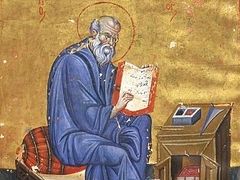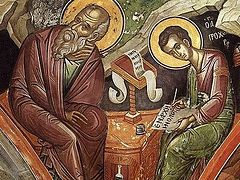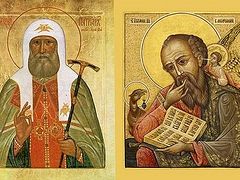Today we celebrate the great Apostle John the Theologian, so often called in the Gospel “the disciple whom Jesus loved.” If Jesus loved him for his fiery love for Him, then he enjoys special boldness before Him, because love gives boldness before the beloved, as the Apostle himself says: There is no fear in love; but perfect love casteth out fear… Herein is our love made perfect, that we may have boldness in the day of judgment (1 Jn. 4:18, 17).
John is the apostle who, by the power of his love, saved the youth who had become the leader of a band of robbers. And if he, while still living on the Earth, by his love delivered people from obvious destruction and brought them to Christ, then all the greater is the boldness and saving power of the Apostle’s love after his death. And if the ordinary prayer of a Christian, filled with love for a transgressing brother, has great power: If, says the holy Apostle in his epistle, any man see his brother sin a sin which is not unto death, he shall ask, and God shall give him life (1 Jn. 5:16); then what power does the prayer of Christ’s beloved Apostle have? It’s not without reason that the holy Church inspires us to cry out to him: “Beloved Apostle of Christ our God, hasten to deliver a defenseless people. He who allowed you to recline on His breast, receives you as you bow before Him.” It’s not without reason that the holy Church calls us “to bless the ever-memorable John, who is translated from Earth without leaving the Earth,” with the spirit of his love, prayer, and strong help. Where the spirit of love blows, it is easy and free to breathe. Therefore, let us fearlessly approach the holy Apostle, although it is fearful for us to draw near to him in our sins with which we so offend God; we are hardly able to enter into communion with the host of saints, who are quite unlike us.
What does the holy Apostle, who has gained such boldness of love from Christ God, teach us with his words and the deeds of his life? Is it not how to find God, how to enter into blessed communion with Him, and how to find in this communion all that the soul sought in vain on Earth but did not find, wandering along paths far from God? When the great Prophet and Forerunner of the Lord appeared on Earth preaching of Christ, the holy Apostle John immediately followed him and became his disciple, to learn of the coming of Christ God into the world. And when the holy Forerunner pointed to Christ, John immediately followed Him and walked steadily all his life.
What helped St. John find God so soon and persistently follow Him his entire life? Love for God and purity of heart. Every human being already naturally has love for God. Just as a plant is drawn to the light of the sun, so the soul of man is drawn by love to the spiritual sun, to God, from which it received not only its existence, but also its image. Like attracts like.
Look at vapor or drops of water, how they tend to merge into clouds, or streams or lakes, until they merge into one ocean. Do not human souls strive to merge with the ocean of Divine love? But the quicker that drops of water unite in streams and reach the ocean, the fewer obstacles are encountered on the way; the more the path slopes downward, the quicker that human souls unite with the ocean of Divine existence and love; the more that souls themselves are inclined to God, the fewer the passions standing on the path to God as insurmountable barriers. The holy Apostle John had such a strong attraction to God, such a propensity for communion with Christ; the soul of the Apostle was so drawn by love for Christ when He appeared, so free from any passion hindering the path to Christ, his heart was so pure—for true love is pure—and he was the first to fulfill that which the children of the holy Church were taught: Love not the world, neither the things that are in the world. If any man love the world, the love of the Father is not in him. For all that is in the world, the lust of the flesh, and the lust of the eyes, and the pride of life, is not of the Father, but is of the world (1 Jn. 2:15-16).
Only a pure heart can know God and soon find Him, as the Lord Himself said: Blessed are the pure in heart, for they shall see God. A pure heart reflects God within itself, like a pure eye or a pure mirror, and cannot but see God. But in a fallen man, this mirror is spotted and broken. That is why those whose hearts are not pure, are clouded, and polluted by the passions of life, do not see God, or practically not at all. How often such people seek God their whole lives, armed with science, but cannot find Him; and so the words of the Psalmist come true with them: The fool hath said in his heart, There is no God. Passions cloud the eyes of the heart and hinder the knowledge of God. For how often do laziness, a passion for pleasures, and other passions prevent a man from being drawn to earthly wisdom, as a scientist often loses his impartiality in his research when he gives himself over to some kind of passion. Is it not then all the more necessary to say this about the knowledge of God? Only a pure heart can know God.
How often people who are carried away by passions do not want to know God at all: “What for?” they ask. These people, who think it’s better to study the most ridiculous myths and legends of men, so often consider it superfluous to study the Gospel of Christ, written by God-inspired apostles and prophets. They don’t want to know what happened to the Church of God in ages past and what will be in the coming ages. They are like those sailors who, seeing a leak in their boat, pay it no mind because they don’t yet see any water under their own feet. When they eat the fruit of a tree, they don’t want to know where or how it grows.
Conversely, he who loves God from a pure heart is given knowledge from Him (1 Cor. 8:3); he often knows God just like, or even more than a learned theologian. After all, the knowledge of God is implanted as an instinct in human nature. Look at an animal or an insect, which manifests great infallible knowledge and wisdom from the first days of its life by nature and not by learning, like a bee building a honeycomb or extracting honey. In the same way, a pure heart carries the knowledge of God within itself. It is only by listening to the voice of the conscience, to the natural impulses of one’s own soul that are unperverted by passions that knowledge of God is revealed to man. This is why the Lord said: I thank thee, O Father, Lord of heaven and earth, because thou hast hid these things from the wise and prudent, and hast revealed them unto babes (Mt. 11:25).
Love helps to multiply knowledge. It makes you so attentive to your loved one, it helps you notice the smallest detail of their life, the smallest features of their character, and intimately links you with the very spirit of your loved one. Does not love for God help us to know Him more than much studying of theology? It makes you akin to God, and then like easily comes to know like. This is why it was given to a pure-hearted apostle, full of love, to become a “Theologian,” and to extract the “depth of wisdom” from the bosom of Jesus, along with the blessed love for Christ that burned within him. His teaching about God the Word is the beginning of the theology that was revealed at the Ecumenical Councils by the most learned pastors and teachers of the Church, who spoke about the Trinity, Its essence and Hypostases, of the two natures in Christ, united unconfused, undivided, unchanged, unseparated, and so on.
Let us try to love Christ with a pure heart. Our soul is drawn to Him, for it is Christian by nature (says Tertullian), and only when it is distorted by passions does it try to withdraw from Him. Love makes a man wise, full of knowledge deeper than any scientific or philosophical knowledge. It fills the soul with sweet bliss that cannot be found anywhere on Earth, for it can only be drawn from the inexhaustible ocean of Christ’s Divine love. Amen.





